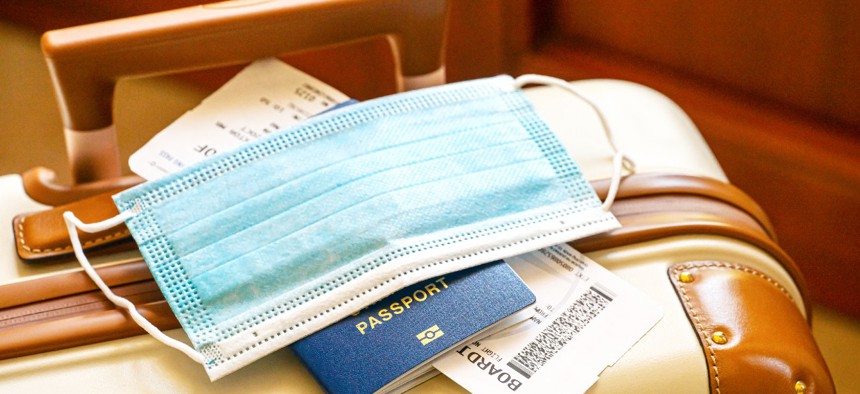
Iryna Veklich/Getty Images
Confusion and Uncertainty Marred Evacuation of 1-in-5 Overseas Federal Employees During the Pandemic
The government has taken few steps to better prepare itself for future crises, GAO said.
The State Department oversaw a chaotic evacuation of federal personnel stationed overseas at the outset of the COVID-19 pandemic, according to a new report, and has failed to update its policies to ensure a smoother operation in future crises.
About 20% of the 22,000 federal employees abroad came home from their posts in the first months of the pandemic, according to the Government Accountability Office, though the process was conducted on an ad hoc basis that left agencies and staff alike unclear on eligibility and implementation details. State, the department employing two-thirds of feds overseas and tasked with overseeing safety policies for the entire workforce abroad, first issued global evacuation guidance in March 2020. Most employees were eligible to leave, but not required to do so.
State failed to communicate its plans with other agencies, however, leaving them to react only after the department made its guidance public. About two-dozen federal agencies have a presence overseas, which GAO said were left to provide unclear direction to staff and were unable to prepare for their employees’ travel. State first authorized evacuations for 60 days, subsequently extending them for 30 days through December. GAO called the approach disruptive, as employees and their families did not know when they would have to return to their posts. As each 30-day period came to a close, employees faced uncertainty and anxiety about their housing, children’s schooling and other issues. Many lived in one-month leases and moved up to six times while stateside.
While State’s approach was understandable due to the evolving nature and understanding of the pandemic, said Jason Bair, GAO’s director of international affairs and lead author on the report, it came with a cost.
The process made it “much more difficult and so much more stressful,” Bair said.
State also allowed posts to set individual evacuation policies. This led to additional confusion, GAO found, as employees were unclear which set of rules to follow. Employees under a post-specific evaluation were entitled to different monetary allowances than those operating under the global evacuation.
While State authorized a global evacuation, it required nearly all posts to maintain emergency duties. The department required each post to keep a specific list of functions operable, but did not provide any guidance on how to assess what would constitute a sufficient skill or staffing level.
Officials told GAO that they “struggled with decisions on staff drawdowns” and resources made available to assist in that decision making were “inadequate.” Some posts were ill-prepared for the number of employees requesting to evacuate, while others relied on outdated plans that did not apply to a pandemic situation.
“Evacuation policies were a real sticking point,” Bair said. Each post had “a hard time figuring out, ‘Who do we really need to stay here?’”
Despite its difficulties, State still has not updated its policies to account for potential multi-post evacuations since it ended the global policy in December 2020. Bair said it was forgivable that State was caught off guard when the pandemic began, and in many ways the department transitioned successfully, but it should be more proactive in preparing for a future event because “you never know when the next crisis is going to come.”
“Establishing an evacuation policy that applies to more than one post, such as the global evacuation policy for COVID-19, could enhance State’s ability to identify and develop policies before a future regional or global crisis,” GAO said.
Employees who remained at their posts reported taking on new responsibilities due to less on-site staff, including more consular work, setting telework policy and checking in on evacuated properties for issues like rodents and leaks. Like all federal agencies, State dramatically increased telework usage. It does not, however, track telework rates overseas, which GAO said leaves the department unable to make data-based decisions about telework policy going forward.
While State conducted an interim review part way through the pandemic, it has not collected lessons learned from many posts around the country. GAO recommended it create a stricter policy for gathering and incorporating those lessons. It also said State should create a multi-post evacuation plan that is updated with information from the pandemic, issue better guidance on interagency communications, improve directions on emergency staffing levels and assess overseas telework use. State generally agreed with GAO’s suggestions.
“They had a really positive reception throughout the course of the work,” Bair said. “We’re going to follow up because we think these are really important.”







